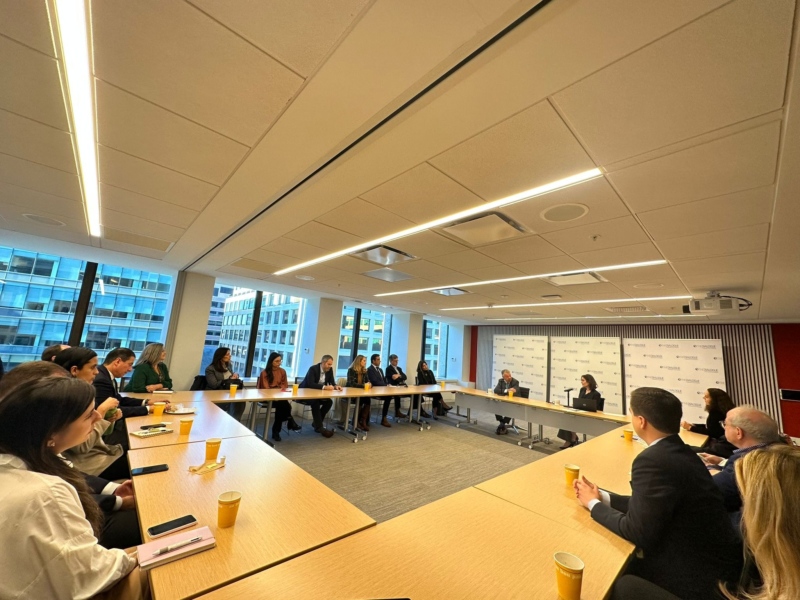Rising Brazil: The Choices Of A New Global Power
What should we expect from a newly powerful Brazil? Does the country have the capacity and leadership to be a central actor in addressing critical global and regional problems?
On December 9, 2022, the Inter-American Dialogue invited distinguished political scientist Jorge Castañeda Gutman for a conversation to discuss the state of democracy and opportunities for the region. Castañeda, a renowned author and highly regarded professor in Latin American affairs, served as Mexican Secretary of Foreign Affairs from 2000-2003.
Rebecca Bill Chavez, president and CEO of the Dialogue and moderator of the event, raised two questions to initiate the discussion: 1) What is the future of democracy in the region, and what are some challenges and bright spots? 2) In the context of the Biden administration’s commitment to supporting democracies around the world, what is your assessment of the administration’s policy towards the region?
Discussing the region at large, Castañeda noted that politics in the region are highly complex, making the implementation of national programs extremely challenging. Globalization has reduced attention spans and increased the speed at which populations expect to see change. As a result, a growing number of citizens have become frustrated with democracy and its ability to deliver. On the other hand, some bright spots include the defeat of Jair Bolsonaro and his anti-democratic platform in addition to Chile’s ability to channel social unrest into political movements.
Turning to Mexico, Castañeda argued that there has been a degradation of democracy across the country. In addition to corruption, he noted that militarization represents a clear threat to democracy. Besides the complete militarization of the National Guard, Castañeda highlighted the increasing role of the armed forces in projects such as the Tren Maya, a rail construction project in the Yucatán Peninsula, airports, and customs.
Regarding the Biden administration’s relationship with Mexico, Castañeda discussed the surprising continuity between the Trump and Biden administration’s stance toward Mexico. Migration continues to be the top priority for the United States, which explains the administration’s unwillingness to call the Andrés Manuel López Obrador (AMLO) administration out on democratic backsliding and other important issues. Castañeda described a dynamic in which the AMLO administration constantly “dares” the Biden administration to put forward grievances publicly, which the White House almost never does. Castañeda also noted that the AMLO administration is missing an opportunity for greater relations with the US.
In response to a question regarding the role of China in the region, Castañeda explained that Chinese influence is more pronounced in South America than in North America. Castañeda suspects that Brazil, under the leadership of Luiz Inácio “Lula” da Silva, will look more toward China, and he recognized that US officials are growing increasingly concerned over Chinese influence in the region.
On the recent attempted autogolpe by now-Former President Castillo in Peru, Castañeda said it was disappointing that there has been no clear-cut condemnation from regional leaders. While left-leaning leaders such as Lula and President Boric issued statements, these did not go far enough. Castañeda found it telling that no emergency Organization of American States (OAS) meeting has been called by any country and wondered what kind of condemnation would be issued (or not) from leaders if the coup had succeeded.
Lastly, answering a question regarding the future of the inter-American system, Castañeda said he hopes that left-leaning leaders in the region do not reject the OAS and that a successor to Secretary General Luis Almagro should be carefully chosen for the purpose of bringing in some of these leaders. He suggested that the United States could pay more attention to this issue and confirm an ambassador to the Organization.
Castañeda concluded by urging the Biden administration to show greater commitment to democracy and human rights in the region, particularly in its relationship with Mexico.
What should we expect from a newly powerful Brazil? Does the country have the capacity and leadership to be a central actor in addressing critical global and regional problems?
By all accounts, Spain wants to bring change to the European Union’s Cuba policy. In so doing, it is tackling a foreign policy challenge that often sheds more heat than light.
When Haiti was struck by a devastating earthquake, the administration of U.S. President Barack Obama quickly absorbed the depth of the tragedy and necessity of a robust U.S. response. Unless the U.S. adopts a proactive role, Haiti’s fragmented political landscape threatens to deteriorate into a political vacuum that will compound the current crisis.
